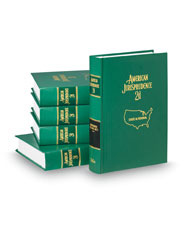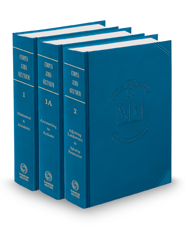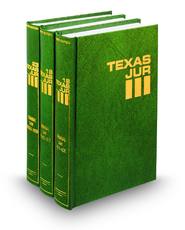
Legal encyclopedias, such as American Jurisprudence (AmJur), Corpus Juris Secundum (CJS), and Texas Jurisprudence (TexJur), are secondary sources that provide general background information on different areas of the law. They also provide citations that can be helpful, mainly to cases, but occasionally to other primary and secondary sources.
TexJur is specific to Texas law and is one of the existing state specific legal encyclopedias. Beyond Texas, only 15 other states have their own legal encyclopedias. Lexis publishes encyclopedias for Michigan, Minnesota, Pennsylvania, Tennessee, Virginia, and West Virginia. West publishes encyclopedias for California, Florida, Illinois, Indiana, Maryland, Michigan, New York, North Carolina, Ohio, and South Carolina.
 |
 |
 |
Legal encyclopedias are typically used to gain a broad overview of a particular legal subject, and to become familiar with a subject's terminology and contexts in which the law is used. Accordingly, legal encyclopedias should be used early in the research process.
Legal encyclopedias are available in print and online. At Tarlton, all three can be found in the main reading room on the second floor.
Online coverage, as of 11/2021:
| AmJur | CJS | TexJur | |
| Bloomberg | No | No | No |
| Lexis | Yes | No | Yes |
| Westlaw | Yes | Yes | Yes |
In general, using print is a four-step process:
Some other finding tools in print that can be helpful instead or in addition to the index are the Table of Laws and Rules and Table of Cases (although AmJur lacks a Table of Cases). For example, if you know a USC, CFR, or case law citation already, you can look it up to see where it is discussed in the legal encyclopedia. (Depending on the time of year, an additional update volume may be on the shelf for the indexes of TexJur and CJS.)
Online
The online versions include tables of contents, but an encyclopedia's contents are so vast that a table of contents is not of much help. Indexes can be difficult to use online compared to print. Lexis does not make the indexes available at all. On Westlaw, the indexes are searchable and browseable, but are still easier to use in print.
When researching online therefore, a researcher will probably end up doing a terms and connectors or natural language search. Because short entries lend themselves to flipping quickly back and forth between sections, it may still be useful to seek out the print versions of the legal encyclopedias, in addition to or as an alternative to the online versions.
Bottom line
Cases in footnotes are most likely dated, but should be to representative cases that are good starting places for research. And remember, as is true for most resources, an online version of any legal encyclopedia is likely more up to date than the print.
In TexJur, references to statutes and regulations are included but not necessarily comprehensive. TexJur is better on Westlaw than Lexis because it includes an index. TexJur also contains a set of softbound Words and Phrases volumes, which include headnotes to Texas cases with judicial definitions from the larger Words and Phrases set. (Options differ online. Words and Phrases is only available on Westlaw; one has to search for the Words and Phrases database first and then limit jurisdiction to Texas--results will be broader online than in print.)
Strengths:
Weaknesses:
